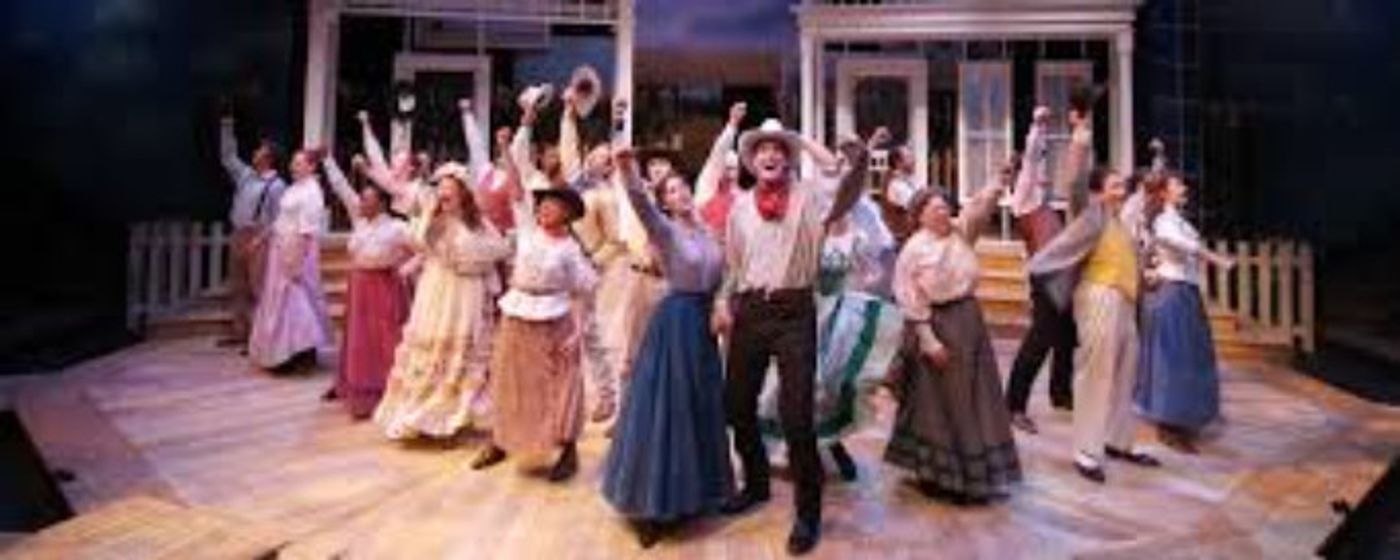Review: History Changing OKLAHOMA Charmingly Ends Porthouse's 50th season

March 31, 1943 was a pivotal day in theatre. "Oklahoma!," the Richard Rodgers and Oscar Hammerstein II's musical opened. The American musical theater was never the same.
For many years the "musical" was vaudeville, reviews, star vehicles, and attempts at telling stories with music and dance thrown in.
Using Lynn Riggs's book, "Green Grow the Lilacs," about young love in the of Oklahoma territories, the area's desire for statehood, and the conflict between the cowboys and the farmers for control of the land, Rodgers and Hammerstein developed a format to be dubbed "the book musical," which set a pattern for the Golden Age of the American Musical (1943-1968).
"Oklahoma!" had a cohesive plot, the songs furthered the action of the story, the spoken words seamlessly segued into the songs, the lyrics and dancing advanced the plot and developed the characters, the first act curtain, rather than displaying a bevy of chorus girls, started with an off-stage voice singing words that forecast what was to happen, the first act ended with a conflict that needed to be resolved in the second act, the language and pronunciation fit the setting.
The results? Not only was it the first theatrical blockbuster Broadway show, which ran 2,212 performances, but it set the pattern for all musical shows to come.
It gave musical creators the idea to develop themes. Rogers and Hammerstein went on to preach social issues including the need to build community. Lerner and Loewe centered many of their scripts on describing the ideal time, ideal place and ideal love story (e.g., "Camelot," "My Fair Lady," "Gigi.") allowed Stephen Sondheim the latitude to examine the grittier sides of life (e.g., "Sweeney Todd" and "Assassins.")
"Oklahoma!" takes place outside Claremore, in the Oklahoma Territory, in 1906. It tells the tale of a farm girl, Laurey, and her courtship by two rivals, the wholesome, clean-cut Curly and the sinister, frightening farmhand, Jud Fry. As is the case in the Rogers and Hammerstein book musical mode, there is a secondary plot, in this case, impetuous cowboy Will Parker and flirtatious ("I'm Just a Girl Who Can't Say No") Ado Annie.
Of course, before the obvious happy ending, there are complications, humor and lots of singing and dancing.
"Oklahoma!" is the kind of show that Porthouse audiences love and artistic director Terri Kent, stages so well.
Kent has taken an interesting tack with this production. She has cast "young." While most stagings use mature performers for the leading roles, this production has age-appropriate actors. This gives the show an authenic, rather than a theatrical look and feel.
Matthew Gittins is natural and charming as the love struck Curly. Rather than playing the role "macho" and "conceited," Gittins is somewhat awkward and real. He uses his excellent voice to develop ideas, rather than singing just words. "Oh, What a Beautiful Morning" sets the right tone for the entire show and his duet "People Will Say We're in Love" and its reprise, sung with Rebecca Rand, delightfully developed their characters.
Lenne Snively didn't portray Aunt Eller, she was Aunt Eller. She had just the right levels of love and gumption.
Though she has a beautiful singing voice, on opening night pretty Rebecca Rand showed little of the underlying tenderness needed to make Laurey appealing. Maybe opening night jitters caused some overacting. Hopefully, she will show more depth than the one dimensional "ornery" as the show runs.
Samantha Russell, though delightful as Ado Annie, screamed her way through her opening scene, and didn't visually and orally play enough with the usually delightful "I Cain't Say No." She relaxed in the second act and was much more playful in "All Er Nuthin."
Christopher Tuck was endearing as Will Parker. He showed talent as a singer, dancer and comedian. 'Kansas City" and "All Er Nuthin" were show highlights.
Joey Fontana delighted as Ali Hakim, and Sam Johnson was so menacing as Jud Fry, that during his curtain call bow, he actually got "boos," one of the greatest compliments that can be given to a villain. His "Lonely Room" was well interpreted.
Jennifer Korecki's large orchestra played well, Cynthia Stillings' lighting and Nolan O'Dell's creative set added to the production quality.
John Crawford-Spinelli's choreography was creative. Though the dances of Agnes DeMille, the cornerstone of the original "Oklahoma!" were brilliant, new approaches are welcome if they are appropriate for the storyline and develop the proper mood. Crawford-Spinelli's well-conceived ballet and his enthusiastic "The Farmer and the Cowman" were welcome creations.
CAPSULE JUDGMENT: Porthouse ended its fiftieth season on a high note with the well-conceived "Oklahoma!." The Kent State professional summer theater should look forward to more years of audience-pleasing shows under the stewardship of Producing Artistic Director Terri Kent and Executive Producer Eric VanBaars.
Side-note: Before the opening night performance a representative of Actors' Equity presented the theatre with a proclamation in honor of their 50thanniversary which included praise for not only Porthouse and Kent State University, but for Terri Kent, who has been leading the endeavor for 18 successful years. The words praised the venue for not only setting high professional theatrical goals, but for being a place where support, encouragement and respect is stressed.
"Oklahoma" runs at Porthouse Theatre through August 12. For tickets call 330-672-3884 or go online to http://www.porthousetheatre.com/.
Reader Reviews
Videos

